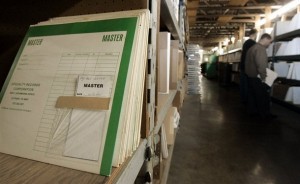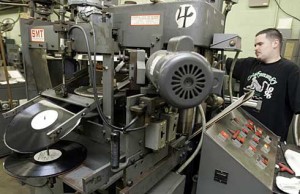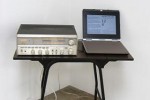Vinyl is booming. There was one year about 10 years ago that I heard that one model of turntable (Technics 1200’s) outsold all models of electric guitars combined. The industry died down a bit after that, but recently vinyl has seen a resurgence and has been setting sales records (no pun intended).
I’ve released my own records in the past, and thought that I would share some of my experiences in the hopes that it may give you some ideas or insight into how it all works. Please keep in mind that my experience is mainly with electronic dance music, but most of the information here could be applied to other genres.
 Remember that this article is really only one man’s opinion and based on my own experience in dealing with distributors and what I have learned from speaking with other people in the industry. If you have any comments or don’t agree with something that I say here, then please don’t be shy and add a comment to the bottom of this article.
Remember that this article is really only one man’s opinion and based on my own experience in dealing with distributors and what I have learned from speaking with other people in the industry. If you have any comments or don’t agree with something that I say here, then please don’t be shy and add a comment to the bottom of this article.
Arguably the easiest way to get your music out there is to get signed to a record label. This means sending demos to established labels or better yet having friends who can introduce you to labels. There have been volumes written on this subject so I will not go into them here (perhaps in a later post). Suffice it to say, labels make your job easy because they do all the work that would normally take you away from making your next big track. Labels often have good distribution deals & can promote your record far better than you would be able to on a limited budget. They can get your record into the hands of Big name DJ’s, to magazines for review, and scope out the playlists to see who is playing your track. They can also get your track onto compilation CD’s which can result in some half-decent revenue. My first records were all released by labels.
So, why the heck do it yourself? Some possible reasons for wanting to do that are:
- you can’t find a label to release your music
- you are sick of dealing with labels and fighting to get paid
- not wanting to give away any of the profit to labels
- you don’t care about the expense, you just want a release!
- you think it would be fun to do
Releasing a record yourself
What to expect
Expect that unless you really work your butt off, your record will not sell, and you’ll lose all your money you’ve spent. Even if you do work your ass off, it still might not sell. The market is constantly saturated with new music. Everyone is fighting for sales and for distribution. In fact, most vinyl releases *lose* money. Unless your track is a hit, expect to lose money on your first release. Why would anyone want to press vinyl then? Because the release might be picked up on a DJ compilation CD, a TV show, movie, etc and there can be some big money there.
The steps to getting your record out there
1. Create a Label
Ok, you’re going to have to deal with distributors, and they deal with labels, so you’re going to have to start a record label. Choose a name, register the business, and that’s about all you need to do. Make up a snappy logo, and make some letterhead on your inkjet or better yet, get some printed it’s not too expensive & looks a lot better.
If you’re feeling creative, make a small website, but you can always leave that for later. There are thousands of free website templates out there.
2. Getting tracks
Ok, now you’re a big-shot record label executive. You need some music. There are 2 choices here, use your own music, or find someone else’s (or a combination of both). For this example, we’re releasing our own music, because that’s the reason you’re reading this.
Find your absolute 2-4 best tracks. Make sure they are great tracks. Talk to your dj friends, ask them what they honestly think, and if they would buy them (ask them to play them out if they can & let you know the reaction). Don’t ask your mom. Maybe your DJ friends can help you pick your best tracks. Make sure the tracks have good lead-ins & lead outs & are DJ-friendly. I won’t go on about how to make dance tracks, because again there are better places to find this information.
Now, the absolute maximum running time you want on each side is 14 min. Many people would recommend a lot less. The shorter it is, the louder it can be on the record, so check your times. If you have only 2 really good tracks, get your friends to remix them and use those in addition to the original mixes on your record. Two extra remixes are better than 2 other mediocre tracks.
3. Pre-Mastering
 OK, so you have your music. Now you need to get it sounding as good as possible. There are 2 choices here: doing it yourself, and paying for a pro to do it.
OK, so you have your music. Now you need to get it sounding as good as possible. There are 2 choices here: doing it yourself, and paying for a pro to do it.
I would strongly recommend against doing it yourself if you can afford to. You’re too close to your music, you’ve lost objectivity because you’ve likely listened to it 1,000 times. You need fresh ears. You need good monitoring. you need good gear. If you decide to do it yourself, A/B your music with commercially released records that you think sound really good. There have been volumes written on doing your own pre-mastering, so again I won’t go into it here.
Paying someone else to do it for you will cost between $200 – $500 USD for an EP. Listen to records and CD’s that you think sound good, and find out who mastered them (sometimes it’s written on the CD case or record jacket, sometimes you have to Google it. Make a list of all the mastering studios & contact them all. Many will negotiate. Make a decision, but hold off getting them to do it for now, because you now need to make an important decision:
4. What do I send to distributors, vinyl or CD?
There are 2 choices here, you can either send them a test pressing of your record, or you can send them a CD. By a wide margin, distributors prefer vinyl, or even better – a copy of the finished product. Many record labels send out test pressings (or white labels) because it’s cheaper (white labels can’t be resold) and because they haven’t released the record yet. The problem with sending vinyl, is that you’re going to have to eat some cost before you even know if any distributors even want to order your record.
If you want to dramatically reduce your speculative cost, you can send them CD’s. Some won’t accept CD’s, but many will. Sending out CD’s will definitely reduce your chances of your record getting picked up by a distributor, but you may be able to see if there is any interest without spending too much upfront cash, and then send out test pressings if there is a good response.
Let’s assume you are sending test pressings, because your tracks are simply amazing – Send off your tracks to get pre-mastered. If you’re not happy with the results, tell them and send it back. They should make the changes without charging you, but make sure of this first.
5. Deciding on labels, jackets, etc
If this is your first release, stick with plain white jackets. It keeps the costs down and makes one less decision, expense and task that you have to worry about. Center stickers are cheaper if they are 2 color, but more colors isn’t much more expensive. Do up the graphics for the center sticker yourself to keep it simple, or get a friend who is good at graphic design to do it for you. Put all the important info on it, your artist’s names, track names, website, label name, release number, contact info, etc. Take a look at a released record & put the same info in it that they do.
6. Pressing white labels or promo copies
 These will be records with plain white labels. You will be pressing these for 2 purposes: as a test pressing to see if any pre-mastering/mastering changes need to be made, and to send out to distributors and as promos.
These will be records with plain white labels. You will be pressing these for 2 purposes: as a test pressing to see if any pre-mastering/mastering changes need to be made, and to send out to distributors and as promos.
You need to decide how many of these to print. You will need 1 or 2 (some distributors want 2) records for every distributor you send a demo to, plus some for promo purposes. Look at pressing 40-200 test pressings based on how many distributors you will be contacting & how much (if any) promo you want to do (see below)
I’m not going to go into the process of printing, as again there are many excellent resources here. Many pressing plants will want 50% up front and 50% before they ship them to you. Shop around, get some prices, try and negotiate a bit, and maybe talk to some labels who deal with them for references.
7. Getting the word out
A great way to get distributors interested in your release is by showing them that the world is eagerly awaiting it. To do this, many labels deal with promo companies who take payment to send your record out to magazines (for review) and big name CD’s. Some will also monitor DJ playlists and top 10 lists and report back to you. This stuff is gold for getting distributors interested. Some of these companies are better than others, and it’s best to try and get some references.
Expect to spend $200-$500 doing this & expect to have your release 2 months or so after you get your promos out.
This step is not crucial, and it’s easy to get ripped off. If you don’t have the money, then forgo it, but a little money here can go a long way if you’ve got a really good record.
You can also take a grassroots approach & send your record out to mags and CD’s yourself, but it’s tough, time-consuming, and there is no guarantee anyone will actually listen to it!
8. Distribution
This is the tough part.
Acting as a label & dealing with distributors is very similar to being an artist and dealing with labels. You need to send out demos and wait for some interest or response. Distributors of vinyl are having a tough time of it lately, – they often have stock they can’t move, and the industry is in a bit of a slump (other than the really big guys who are selling like mad) and you are asking them to take a risk on your music by buying it from you. Expect a lot of NO’s.
Be careful with who you send demos to. Look at your own records that are similar to your new release and find the distributor. Get on the internet. Do some searches. Compile a big list & start checking them out. Don’t send a demo to a distributor who doesn’t distribute your kind of music or who only deals with a select group of labels. It’s a big waste of time and money, test pressings are not cheap!
Write a letter to the distributor telling them that you are sending your latest release for consideration (they usually have an A&R department sound familiar?). include a bio of the artist (you!), an order form, and of course a copy of the test pressing (or CD).
You need to tell them the release date and the pricing. Records are usually purchased for $3.75 each from labels. That’s right. What, you expected to make more per unit? Also include reviews (if any), who is playing your record, where, and details of any publicity campaign that you have undertaken for this release.
9. Pressing
Since you have already pressed some test pressings, you will have made a commitment to the pressing plant for the total amount pressed. Usually 500-2000 copies. If you sell out, you will likely break even on 1000.
10. Filling orders
If you are at this stage, you’ve likely gotten orders for your record from distributors. If not, you’re going to have a heck of a lot of copies of your record, and maybe now to need to re-evaluate your promo campaign!
Some pressing plants will drop-ship (for a fee) right to the distributors. If not, pack them up (you can buy record boxes off the internet), and send invoices for the cost of the records & the shipping costs. Expect to get paid in 30-60 days. You may have to chase payments, but it comes with the territory.
11. Returns
Something you need to realize is that if a distributor doesn’t sell all your records, they can send them back to you for a refund. Make sure you are ready (and budget for) for a 10-20% return rate. You’ll have to come up with this money.
12. Retiring rich/cost analysis
 Here’s a sample calculation of the costs of doing all of this, assuming you get your friends to help with art, etc.. this is based on 1000 records, including promos, and doesn’t include letterhead and other business costs:
Here’s a sample calculation of the costs of doing all of this, assuming you get your friends to help with art, etc.. this is based on 1000 records, including promos, and doesn’t include letterhead and other business costs:
Pre-mastering: $250
Center labels: $150
Pressing (1000): $2000 includes jackets and paper sleeves
Promo: $250
Demos to distributors: $100 (mainly shipping costs)
Shipping from pressing plant: $40
TOTAL: $2790
Now, let’s say you are sending out 150 records to distros and for promo purposes. This gives you 850 records that you can sell. Let’s assume you completely sell out (it was a great record, wasn’t it?), that will net you $3.75*850 = $3187.50
Expect 15% returns, which means you have to come up with $478.12 for returns
So:
Costs: $478.12 + 2790 = $3268.12
Income: = $3187.50
Bottom Line
Profit = – $80.62
As you’ve just found out, pressing a record isn’t going to make you rich unless you get some licensing deals for TV or compilation CD’s. You can also get paid for radio play if you register with your country’s tracking agency. Nevertheless, it can be a lot of fun (and work), and it’s really nice having your track on vinyl to put up on the wall!






First of aal JP, such good point’s man.
Average techno house / 300 copies 4 track record 15 min max each size.
Cost can be around 800 euros with a good P&D (Publishing & Distribution) deal, if you can fix it.
Max 1200 inc mastering. just fix a stamp like 90% of its label and stamp it on white label, send them out by the press plant to your distributor.
This post makes it all seem so hard and expansive, who tf is gonna press 500 / 1 k records as a starter :S you nuts. Only if you know you gonna sell atlas 70% of it.
Ment to say 90% of the labels today just stamp on white label
Great write up!.. The dream of being a vinyl artist has been tumblin’ ’round my brain since ’78 & this is the kind of content that I’m constantly looking for.. Tip’s-n-trick’s from people that have earned their “been there, done that” experience & are more than happy to share it through the passing on of knowledge to this seemingly lost art.. It’s great to see that more pressing companies are surfacing again & the owners/staff are just as passionate about what they’re doing as the indie-artists are about what we’re doing..
IMO, releasing vinyl isn’t as much about making money though, or becoming rich-n-famous.. To me it’s just as much about leaving something behind that could potentially end up being discovered & re-discovered over-n-over many years after I’m long dead & gone.. I think that anyone who “knows” record stores will know what I’m saying because we’ve all picked that faded LP jacket from that band that we’ve never heard of & based on the cover art alone said to ourselves, “I have to buy this”.. Discovering later that you’ve stumbled across the most amazing thing “you’ve” ever heard & yet it was released 10-15 years before you were even born.. I love that feeling when I discover an old band that’s “new & fresh to me”.. It just makes you want tell the world this great band.. It’s like a moment of spiritual enlightenment that’s brought about by the hap-hazard discovery of profoundly great music, or a profoundly great band..
Yes, I definitely believe that releasing your works on vinyl does come with a certain level of immortality as long as your thoughtful of every step you take in writing, recording & releasing your works on vinyl.. Whether you end up being a household name, or you go to your grave with a belly full of Top Ramen, your vinyl will live on from content-to-cover art in finders stores & flea markets for years (possibly even centuries!) after your gone..
Rich-n-famous??.. I don’t know why anyone would want anything to do with that.. There’s a lot of lonely people living in large-n-lavish houses.. =(
Largely unknown globally, yet successful in your own rite??.. Show me where to sign!!?.. At the end of the day I think that it would be more gratifying to be able to say to yourself that through hard work & dedication you managed to successfully carve out a modest following that supports what you do, every time you do it..
Amen..
My band is not on a label. We recorded, mastered, and then pressed 100 records. The records cost 950 total, shipped to my door. I went to a local printer and he printed the jackets for $200. They turned out really nice. I sold 17 records the first day just through Bandcamp. I sold handfuls to local record stores, and found an online retailer that bought 15 copies from me. They’re continuing to sell, trickling out a few to people in person. The ones in stores are selling quick. Currently, i have made my initial investment back and will probably make a profit. We will do a re-press and that’s a much lower cost, so higher profit is made on those. This was all DIY and fairly successful.
Nice one man! That is how is supposed to be! Having fun making good music, enjoying the journey, connecting with others, collaborating, expepermentng and along the way falling in love for the rest of our life’s and expiriencing continuous passion for what we do!
Hey man, how’d get them pressed at such a low cost?
From what I can gather, it seems this guy works for a distributor.
The whole article seems to be very distributor biased in that it uses the old ‘scarcity’ trick:IE: There just aren’t a lot of distributors out there that really want to invest in some kind of small time outfit like you so take the 3.75 per record and be grateful you got that.
ARE YOU KIDDING ? total b*LLsH*T!
AS and artist (and potential label, you should NEVER, EVER, sell yourself short. Without you and the plethora of other labels out there selling good, quality, independent music, the numb-nutted distributors wouldn’t be in business, sorry to say. Distributors NEED labels, but labels do not necessarily NEED distributors, dig? A label can do its own PR and sell tracks direct to merchants or via Discogs or digital distribution and completely skip the distribution process, if they want. Distributors, on the other hand, need labels to stay in business. Without labels whos products they can sell at usually a high margin of profit, distributors fail to exist. As a label, never forget this and NEVER SELL YOURSELF OR YOUR LABEL’S ARTISTIC OUTPUT, SHORT.
BE professional, Be courteous, but do NOT be a D*MB*** and allow yourself and label artists to be taken advantage of by any distributor- DO NOT let distributors (or poorly run unethical record labels either, for that matter-if you are an artist) CAPITALIZE on your hard work, your intellectual property and then act like you are lucky they are letting them do so. Without you, they fail to exists, NOT vice-versa. Remember that. Don’t be arrogant, but don’t be a pushover, either. The record business is an ugly little half-baked industry full of hucksters, thieves and that is the ‘good part’ of it.
I am so sick of the perpetuating belief that artists and labels should be lucky to allow a group of people with no creative output whatsoever (yeah distributors, magazines, hype machines etc), dictate to them and be given almost complete control over the delivery of their product and the label (and artists) destiny. WRONG!
I will impress upon everyone that without the creative label/artists’ hard work, the whole industry is non-existent and DO NOT let the people who have nothing to do with making the music, treat you, your work or your label, like you are some kind of ‘red-headed step child’. Your stuff counts, it matters, and you should be proud of that and respected for it. As an artist or label anyone disrespects or acts like they are doing you a favor, find someone else to work with. Keep your chin up, and move on.
NONETHELESS, DON’T TAKE IT PERSONALLY AND LOOK AT IT FROM THE DISTRIBUTORS PERSPECTIVE, TOO.
They could care less about your creative output or the quality of your stuff. They solely care about total output and sales. NOTHING PERSONAL. What incentive do they have to carry your product if they can’t sell it? See where we are coming from here? If you cannot prove to them you are already going to sell a bunch, they most likely don’t want to hear from you. IT’S just business and a flaky one, at that. Most of the guys working at these distributors here in the US, like Revolver or Groovedis, are really, really over-worked and underpaid. You gotta move a hell of a lot of product to pay the rent and keep the lights on in places like that. 5 bucks profit at a time, you see where I am coming from? It really isn’t a glamorous way to make a living, so I feel for them too…but, it doesn’t mean they should ignore, disrespect or treat labels like they are peons, either. It works both ways. Again, nothing personal. If they cannot sell your product, they really just aren’t going to give you much time or effort because it simply does pay to. Now, prove to them you can unload 100,000 copies and a month, guaranteed, there will be alot of ass kissing coming your way from them. Sadly, that’s just how the game is played. But back to your record label.
DO NOT LET THE MUSIC INDUSTRY TAKE ADVANTAGE OF YOU.
Don;t sell yourself short, fall for the ‘scarcity’ tactic nor play the ‘we’re doing you a favor’ game and take $3.75 for a record ONCE YOUR PRODUCT IS READY TO HIT THE SHELVES.
It will cost you upwards of 3000 dollars to produce (yes, after mastering, pressing, shipping and storage costs, it will) the average 500 run 12″-and that is NOT including studio time if you take the tracks to a professional studio to record and mix down)
Are you going to just give that away?
On pure principal, I would rather let OUR LABELS records rot in a dusty garage with NO ONE buying them than give them away to some distributor who might give us third of what it cost us to make those records. We have been in this game since 1984 and out date most of current crop of kids who (minus digital distribution) are repeating the same old tired methods that were used back in the 80’s..not much has changed, sadly…. You can’t expect miraculous record sales when you are repeating the same old, outdated Modus that has made the record industry the sleaze pit of all industries it is….truly..the old ways gotta stop and the labels and artists need to be the ones to put their foot down and get creative..think up a new way of doing things..for.until you do, you will never change things and we will continue to let the crooks rule the roost.
DISTRIBUTION ISN’T A HARD GAME TO PLAY, BUT IT IS ALL ABOUT TOTAL UNITS SOLD. END OF STORY.
I can assure you, had we not given away records to distributors on early releases (to which many NEVER RETURNED OUR PRODUCT NOR MONEY) We as a label would be wealthy today. Some of those records have sold on eBay for thousands, literally, due to scarcity of the record (and No, we don’t have any left to show for it, either). Had we just held onto them, it would have been our label, not some kid who used to work at a distributor, making big bucks selling them for exhorbitant prices on eBay and Discogs.
Now that’s food for thought.
Good luck.
Good article! And great comment JP! You’re a good man!
I agree! Great article and followup info from JP — Cheers! I am about to release an album and there is no way I am just giving it away – $20 FIRM! haha! — Ill give you a Single on compact disc for free when you buy a shirt … haha other than that I have put too much blood, sweat, tears and money into this project for some one to not give me my due credit ( or cash ) haha, please no checks!
what is the $3.75 for?
It was referring to how much you would expect to sell each record for to the distributors.
so the basic message here is… if your tracks arent truely awsome.. dont bother your ass!
I agree with otisbird. For as vast as the underground DIY scene may seem, there’s not a lot of information out there. Some, but not much. I think folks are keeping their secrets to themselves.
so glad u posted this! a google search brings up NOTHING on pressing
your own records. it’s mostly about selling albums that already exist.
i want to press some vinyl records of my band’s cd.
the cd has already been mastered. so what do i do now?
i’m a little confused. i will just be selling it through
my own websites, and the major social networking sites,
as well as cdbaby.com and itunes.
–mary
Thanks for posting all of this useful info. I’ve always wanted to release my own vinyl since I’ve been buying vinyl going back to 1980. I still spin vinyl and would love to put out a D.J. TOOL E.P. with loops. Any tips on sampling and what I can get away with legally ? Thanks again. DJ CRAZE 156 FROM THE BOOGIE DOWN…PEACE…
HI my name is royaty, i am an independent artest.my album reaching for the crown. is due to be release in march of next year 2010 i would like to press a few records for local records store and djs… please get back to me. greatly apperciated….thanks
Nobody is going to be doing radio spots for a budget self-release. The $250 covers promo copies of the record. I’ve had a ton of tracks premastered and they typically cost less than $100 per track for budget-conscious releases. A dance record (which is what the article is based on) usually has 3-4 songs on it, so it’s well within the right range. A mastering engineer usually gives a deal on a record, and $250 is pretty normal for a dance EP.
…except you’ll probably be paying a lot more than $250 for promo (print ads? flyers? radio spots?), and you’ll likely pay more than that for pre-mastering as well.